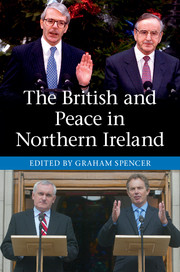Book contents
- Frontmatter
- Dedication
- Contents
- Notes on contributors
- Acknowledgements
- Brief chronology of the peace process
- Abbreviations
- Key documents
- Introduction
- 1 The terrain of discourse
- 2 The Anglo-Irish Agreement: an interview with Sir David Goodall and Lord Armstrong of Ilminster
- 3 The constitutional issue in Irish politics
- 4 Negotiations and positions: an interview with Sir John Chilcot
- 5 Resolving intercommunal conflict: some enabling factors
- 6 Tactics, strategy and space
- 7 The Joint Declaration and memory
- 8 Movement and transition in 1997: Major to Blair
- 9 The challenge of symmetry in dialogue: an interview with Sir Joseph Pilling
- 10 Why was the Good Friday Agreement so hard to implement?: lessons from ‘Groundhog Day’, 1998–2002
- 11 Text and context: an interview with William Fittall
- 12 The nature of dialogue: an interview with Sir Jonathan Phillips
- 13 Managing the tensions of difference: an interview with Jonathan Powell
- Conclusion
- Index
- References
10 - Why was the Good Friday Agreement so hard to implement?: lessons from ‘Groundhog Day’, 1998–2002
Published online by Cambridge University Press: 05 March 2015
- Frontmatter
- Dedication
- Contents
- Notes on contributors
- Acknowledgements
- Brief chronology of the peace process
- Abbreviations
- Key documents
- Introduction
- 1 The terrain of discourse
- 2 The Anglo-Irish Agreement: an interview with Sir David Goodall and Lord Armstrong of Ilminster
- 3 The constitutional issue in Irish politics
- 4 Negotiations and positions: an interview with Sir John Chilcot
- 5 Resolving intercommunal conflict: some enabling factors
- 6 Tactics, strategy and space
- 7 The Joint Declaration and memory
- 8 Movement and transition in 1997: Major to Blair
- 9 The challenge of symmetry in dialogue: an interview with Sir Joseph Pilling
- 10 Why was the Good Friday Agreement so hard to implement?: lessons from ‘Groundhog Day’, 1998–2002
- 11 Text and context: an interview with William Fittall
- 12 The nature of dialogue: an interview with Sir Jonathan Phillips
- 13 Managing the tensions of difference: an interview with Jonathan Powell
- Conclusion
- Index
- References
Summary
When I was a young civil servant in the Home Office in the 1970s, I served as secretary to a committee chaired by Lord Franks, arguably the most distinguished British public servant of the postwar generation. When I came to draft the committee's report, his instructions were for me to write to be understood by an interested general reader, of reasonable intelligence, ‘who was paying attention’. I am not sure how many general readers there will be for a book of reflections by former servants of the British Government in Northern Ireland, but I have tried to follow that prescription here.
This is not a memoir of my time in Northern Ireland. I do not believe that civil servants should write memoirs, and, even if I did, most of the decent anecdotes have already been told by Jonathan Powell and other chroniclers of the period. What it is, is an attempt, after a gap of more than ten years – most of it spent in other busy jobs in Whitehall – to order my own thoughts about what was actually going on in the turbulent period between the conclusion of the Belfast (or Good Friday) Agreement (which, to avoid needless controversy, will from here on be referred to as ‘the Agreement’) on 10 April 1998 and the collapse of the institutions, for the third time, on 14 October 2002. Although not a politician myself, my perspective on these events is political and practical rather than historical or theoretical. As a civil servant, I was always at the pragmatic end of the spectrum, interested principally in what works (and what does not) and how outcomes can be delivered in the real world. The approach I have adopted is to start with some basic facts about the Agreement, which I believe are essential to an understanding of what was going on, and then offer a highly compressed account of the main efforts to break the deadlock over decommissioning and devolution.
- Type
- Chapter
- Information
- The British and Peace in Northern IrelandThe Process and Practice of Reaching Agreement, pp. 229 - 251Publisher: Cambridge University PressPrint publication year: 2015
References
- 1
- Cited by



